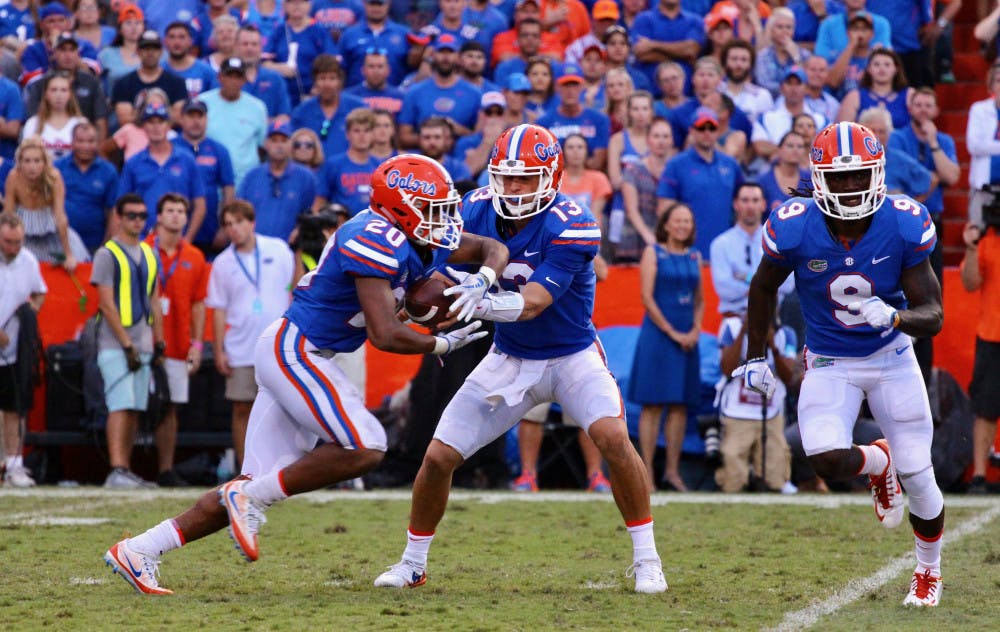Rhythm, pace and communication were three offensive pillars noticeably lacking in the Gators’ 17-16 loss to LSU on Saturday.
Florida’s lethargic tempo was most evident in its final offensive drive. Down by one with 4:01 left on the game clock, the Gators (3-2, 3-1 SEC) were slow to snap the ball, taking 2:22 to run six plays before turning the ball over on downs and effectively ending the game.
“I think we need to speed up the tempo on offense,” offensive lineman Tyler Jordan said Monday. “Some series you’ll see it, we get up to the ball and we’re rolling, we move the ball efficiently. And there’s other series where we’re slow getting to the ball, and then the series doesn’t turn out as well as we wanted it to.”
That sluggishness was obvious to Gators coach Jim McElwain, who said it’s his responsibility to ensure the offense is organized and communicating before the snap.
“It’s on me,” McElwain said. “I’ve got to continue to work on that.”
But UF’s issues with tempo aren’t limited to end-of-game scenarios. Of 130 FBS teams, the Gators rank 123rd in offensive play per game.
And while Florida has been hamstrung by injuries, suspensions and a new quarterback in redshirt freshman Feleipe Franks, McElwain said that’s no excuse for a dearth of flow on offense.
“The expectation, I would say at this point, is to play at a faster pace,” McElwain said.
How does Florida reach that expectation? Gators receiver Freddie Swain, who has taken on an increased role with No. 1 receiver Tyrie Cleveland sidelined with a high ankle sprain, said UF’s communication needs to improve.
“Getting the play into the game, getting (it) from the sideline to Feleipe so Feleipe can get it to us and relay it to everybody else,” Swain said. “We need it. We gotta run more plays.”
Some fans have credited that lack of communication to Franks. In the past, McElwain has said the redshirt freshman doesn’t run the offense as smoothly as quarterback Luke Del Rio, who is out for the year with a broken collarbone.
But while the third-year coach cited a lack of urgency on the final drive, he wasn’t overtly critical of Franks’ hand in the series.
“At times, he goes through with really good command and the flow piece is really good. We've got to continue to work on that,” McElwain said.
Along with communication, McElwain also attributed Florida’s lack of plays to an inability to stop LSU on third downs. The Tigers converted 6 of 14 third downs, stringing long drives together and effectively limiting UF’s time of possession.
“(LSU) did a good job of controlling it,” McElwain said. “You (saw) how they huddled and really were snapping late in the shot clock.”
Controlling the time of possession means taking the ball out of Florida’s playmakers’ hands. For example, Franks’ 8.4 yards per pass attempt ranks top five in the SEC. But because of a limited number of plays, he only averages 15.8 attempts per game. No SEC starter averages fewer.
While the loss to LSU knocked Florida’s season off-course, it at least helped identify arguably UF”s biggest problem on offense.
“Once we get that faster, we get more plays called, we'll get the ball into the endzone,” Swain said.
You can follow Matt Brannon on Twitter @MattB_727, and contact him at mbrannon@alligator.org.
Feleipe Franks finished 17-of-38 with a pair of touchdowns and an interception in Saturday's loss against Kentucky, the program's first since 1986.






